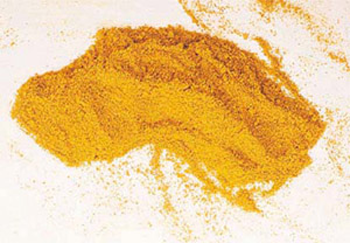Apr 13, 2025
Apr 13, 2025
 Indian scientists have found yet another reason why turmeric should be part of our daily diet.
Indian scientists have found yet another reason why turmeric should be part of our daily diet.
Lab experiments in the past have shown that curcumin - the yellowish component of the Indian curry spice turmeric - is able to fight skin, breast and other tumor cells. It is also known to lower the chances of getting Alzheimer's disease and hemorrhagic stroke.
Now a team at the Madras Diabetes Research Foundation (MDRF) in Chennai reports that curcumin also blocks a key biological pathway needed for development of diabetic retinopathy, an eye complication among diabetics that leads to blindness if untreated.
"This is the first scientifically documented evidence of the molecular action of curcumin against diabetic retinopathy," the researchers claim in a report published in a recent issue of Investigative Ophthalmology & Visual Science.
The study was prompted by an interesting observation made by the MDRF team while analyzing the data from an epidemiology study it had completed in urban Chennai earlier.
The study showed that the prevalence of diabetic retinopathy in Indians is lower than that reported among Europeans suggesting there could be something in the diet that gave protection to Indians. What was that something?
"We suspected it was turmeric," says Mohan Rema, chief ophthalmologist and vice-president at MDRF. The hunch turned out to be correct.
In diabetic retinopathy, abnormal new blood vessels grow in the retina - the light sensitive layer lining the back of the eye - due to a process called "angiogenesis". These new vessels are thin and fragile and tend to bleed resulting in sudden and total loss of vision.
Angiogenesis that involves the growth of new blood vessels from pre-existing vessels is a normal process as in wound healing. But this is also a key step that helps tumors to grow. Angiogenesis inhibitors (or anti-antigenic drugs) prevent the formation of new blood vessels so that the tumor cannot grow.
"Our guess was that curcumin which shows anti-angiogenic effects against various cancers may also inhibit the growth of new blood vessels in the retina and thereby prevent diabetic retinopathy," said Muthuswamy Balasubramanyam, cell biologist and assistant director of MDRF who is one of the authors of the paper describing the study. "Our laboratory experiments have confirmed this."
Diabetic retinopathy results when the so called "endothelial cells" that line the inside of retinal blood vessels proliferate and migrate away from the parent vessels to form a network of new fragile micro capillaries which bleed.
"We have demonstrated that curcumin inhibits the migration of cells thereby blocking a key step that leads to retinopathy," Balasubramanyam said. Other authors of this work include research scholars Zaheer Sameermahmood and Thangavel Saravanan.
Turmeric which is a major ingredient of curry has been consumed for thousands of years and has been used in traditional Indian, Chinese, and Western herbal medicine.
While much of the world literature dealt with the anti-cancer actions of curcumin, the work at MDRF for the first time emphasizes its use against diabetic retinopathy, the scientists said.
Headed by Viswanathan Mohan, a renowned diabetologist, MDRF is exclusively devoted to research on diabetes and its vascular complication.
10-Oct-2008
More by : Killugudi Jayaraman

|
This is a great work on diabetes-induced blindness. Please send me an original preprint to my address: 796 John Glenn Blvd., Webster, New York 14580, U.S.A. Recently, my left eye received a miraculous cure with turmeric-curcumin, after eight year's near blindness. This MDRF team should be congratulated. |